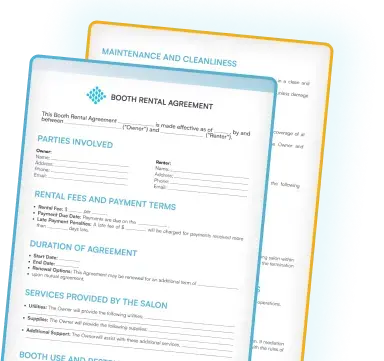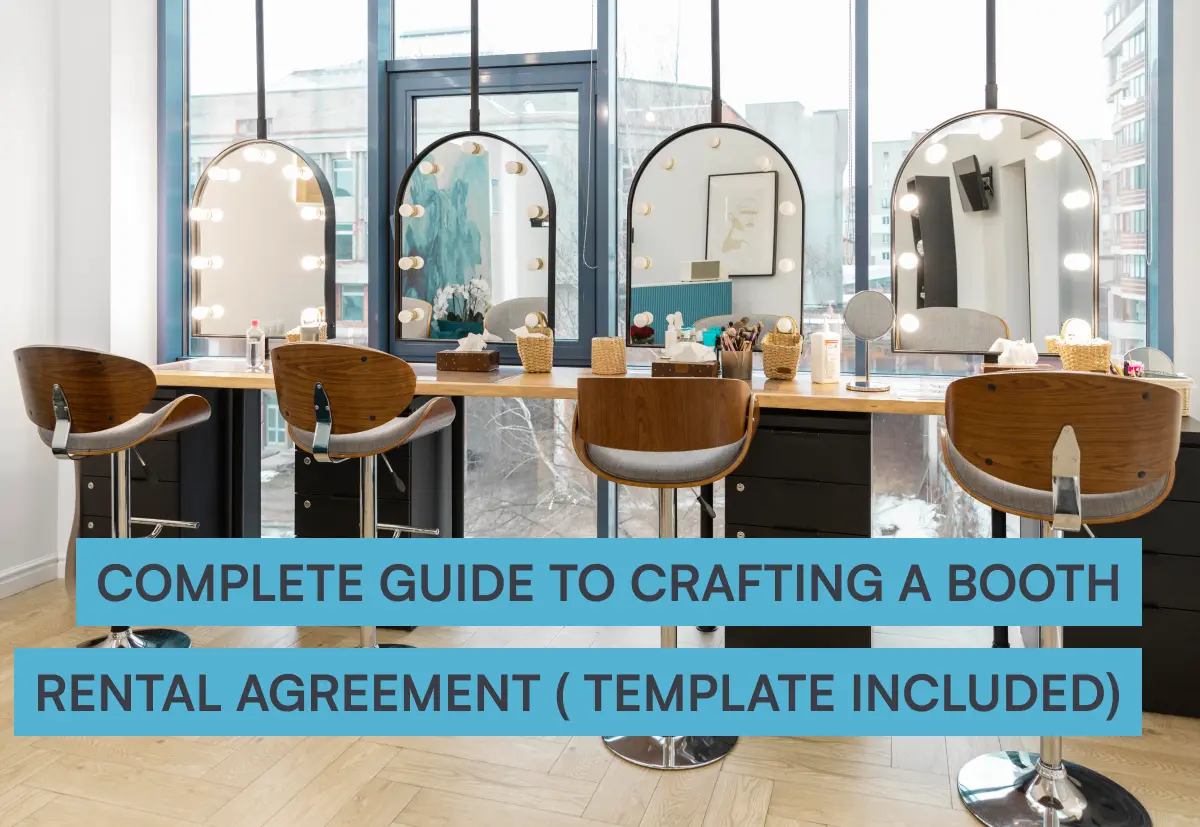Want the Booth rental agreement template? Grab it right here!
Creating a clear salon booth rental agreement is crucial for spas and salons, as it helps protect both the business and the independent contractors renting space.
These agreements ensure everyone knows what to expect, leading to smoother operations and stronger working relationships.
A comprehensive rental agreement outlines important details like:
- Payment terms
- Responsibilities and rules
- Reduces the risk of misunderstandings or disputes.
This guide will walk you through crafting an effective booth rental agreement, providing a salon booth rental agreement template to simplify the process.
The importance of a booth rental agreement
Starting a business from scratch can be expensive, with high costs for real estate, equipment, and staffing. For many professionals, the booth rental model offers a more affordable alternative. It allows them to operate independently without the heavy financial burden of owning a business.
Booth rental is gaining more popularity as the beauty industry grows. In this model, professionals rent space (booth) within a beauty salon owned by someone else, sharing a portion of their earnings with the owner while maintaining control over their clients and operations.
While the model is most commonly associated with salons and spas, it’s also gaining traction in medical spas, where professionals like nurse practitioners, estheticians, and licensed cosmetologists seek more autonomy and flexibility.
Here, a booth rental agreement is crucial for several reasons.
First, it establishes clear rental terms for the arrangement, outlining the responsibilities and expectations of both the salon owner and the booth renter.
This, in turn, helps prevent disputes. By clearly outlining payment terms, work hours, and any rules or policies specific to the salon or spa, both parties can avoid misunderstandings that could lead to conflict.
For instance, if a disagreement arises over service pricing or client ownership, having a written agreement can serve as a reference point, helping to resolve issues more efficiently.
Additionally, a booth rental agreement helps manage liabilities by specifying who is responsible for insurance, equipment, and client injuries.
What to include in a booth rental agreement
A well-drafted booth rental agreement covers various aspects to ensure a clear understanding between the salon owner and the booth renter, such as both parties’ expectations, rights, and obligations.
Below are the key elements that should be included to make the agreement comprehensive and effective.
Parties involved
A booth rental agreement should identify the salon owner and the booth renter. Including full names, business names, and contact information helps ensure both parties know exactly who is responsible for fulfilling the terms of the contract.
Clearly identifying the parties involved can help prevent confusion and disputes in the future, especially in cases of missed payments or property damage.
Rental fees and payment terms
The rental agreement should clearly outline the rental fees and the payment schedule, specifying whether rental payments will be made weekly, monthly, or on another agreed timeline.
This section is crucial for setting financial expectations and helping the salon owner and the renter avoid confusion.
In addition to stating the fee, the agreement should include details on how payments will be made (e.g., direct deposit, credit card, or cash) and specify due dates for payments to ensure everyone is on the same page.
Also, it’s important to have clear rules for late or missed payments, such as stating the fees for late payments or explaining that the contract may end if payments are missed too many times.
Commission
If the rental agreement includes a commission, it should be clearly explained. Some salons may charge a percentage of the renter’s earnings in addition to the base rental fee, especially if they provide services like client referrals, marketing, or booking assistance.
The agreement should specify the percentage (usually between 10% and 50%) and whether the commission is based on gross earnings or net earnings.
The payment schedule for the commission should also be outlined, whether it’s paid weekly, bi-weekly, or monthly. If the commission applies to things like referrals or services booked through the front desk, these conditions should also be made clear.
Duration of agreement
It’s essential to specify the start and end dates of the agreement, along with any options for renewal. With a well-defined duration, there can be clarity about when the agreement expires, leading to misunderstandings or unwanted surprises.
Services provided by the salon
A well-drafted agreement should list all services or amenities the salon provides to the booth renter. It should also specify what’s not included, such as insurance, personal supplies, or any other services the business does not cover.
This includes essential utilities such as water, electricity, Wi-Fi, and supplies like towels and cleaning products. Salons might also offer additional benefits, including marketing support, booking software, and front-desk assistance.
Clearly outlining these amenities provides clarity and means renters can concentrate on their clients without worrying about unexpected costs or misunderstandings.
Booth use and restrictions
Clearly defining how the booth can and cannot be used is essential to maintaining the salon’s brand, ensuring safety, and setting clear expectations.
The agreement should specify any services or products the renter is prohibited from offering, such as treatments that may conflict with the salon’s brand, high-risk services, or use of products that do not align with salon standards.
For example, if a renter were to offer a high-risk service like microblading without knowing that the salon prohibits it due to liability concerns, could lead to significant issues. If not explicitly covered, liability for adverse outcomes – such as allergic reactions, tool mishandling, or client dissatisfaction – could fall directly on the salon owner or renter.
The salon might face licensing, insurance, or safety standards challenges, risking disputes and damaging its reputation. This could leave clients dissatisfied or even lead to legal troubles if an incident occurs.
Maintenance and cleanliness
This section should clearly define the renter’s obligations to keep their booth clean, including daily tidying, sanitation, and proper waste disposal.
It should also address who is responsible for repairs and handling any damages, specifying whether the renter or salon owner covers the costs for issues like wear and tear, equipment malfunction, or accidental damages.
The agreement could state the renter must sanitize their station after each client and perform a deep cleaning at the end of each day.
Additionally, it could be said that while renters are responsible for wear and tear or any minor damage they cause (such as accidentally damaging a mirror or chair), the salon will handle general repairs, like HVAC or plumbing issues.
Insurance and liability
Clear insurance and liability clauses protect both the salon owner and renter from future legal and financial headaches.
Liability insurance requirements ensure that the renter has coverage to protect against any claims arising from incidents related to their services—whether a client has an allergic reaction, a slip-and-fall accident, or a dissatisfaction that leads to a legal claim.
By requiring each renter to have their own liability insurance, the salon owner protects the business from bearing the financial and reputational burden of such incidents.
Termination cause
A well-defined termination clause in a booth rental agreement is essential for providing the salon owner and the booth renter with a clear exit strategy if their arrangement needs to end.
This clause should specify the conditions under which either party can terminate the agreement – such as non-payment, breach of contract, or failure to adhere to salon policies – and outline the required notice period (e.g., 30 days) for both parties.
Without a structured notice period or defined termination conditions, both parties may be left in difficult situations: the renter might struggle to inform clients and secure a new space, while the salon owner could face immediate lost income from an empty booth.
Non-compete or exclusivity clauses
These clauses restrict booth renters from working at competing salons or offering similar services within a defined geographical area for a specified period, either during or after the rental agreement.
This can help prevent clients from following a renter to a nearby competitor, protecting the salon’s revenue and customer loyalty. However, ensuring these clauses are fair and legally enforceable is essential.
For a non-compete clause to be valid, it should clearly state the area and time frame. It shouldn’t create an unreasonable burden on the renter, like banning them from working at a competing salon within 10 km for 12 months.
However, it can protect important business interests, such as trade secrets, proprietary information, or client relationships.
Compliance with laws and regulations
The compliance clause ensures both the salon owner and the renter to comply with local, state, and federal laws thereby minimizing legal complications and maintaining a safe environment for clients.
This clause should cover adherence to health and safety standards, licensing requirements, sanitation guidelines, and any specific business regulations relevant to salon operations.
By formalizing this commitment to compliance, both parties reduce the risk of penalties, ensure consistent quality for clients, and promote a trustworthy, professional environment where legal requirements are upheld across the board.
Dispute resolution
The agreement should include a clear plan for handling problems, like using mediation (a neutral person helps both sides agree) or arbitration (a neutral person makes the final decision). These options are quicker and cheaper than going to court.
By including a well-defined dispute resolution process in the booth rental agreement, both parties reduce the likelihood of extended legal conflicts and encourage open communication and effective problem-solving.
Free Booth rental agreement template for spas and salons

Booth Rental Agreement
Template for download
Effortlessly manage your spa’s operations with Pabau
A booth rental agreement is essential for setting expectations and responsibilities between medical spa owners and booth renters.
Clearly defining the terms of the agreement – such as the rental fees, maintenance duties, and dispute resolution processes – means both parties know exactly where they stand from the get-go. In other words, it promotes a positive working relationship.
Pabau, an all-in-one practice management software, makes managing your spa operations becomes seamless. Our platform offers integrated solutions that streamline communication, appointment scheduling, and client management, ensuring that both salon owners and renters can focus on providing exceptional services.
Book a demo with Pabau and discover how we can help you thrive!




